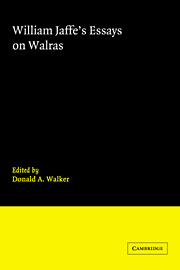Book contents
- Frontmatter
- Contents
- Preface
- Acknowledgments
- Introduction
- PART I WALRAS'S BIOGRAPHY
- PART II THE GENESIS AND DEVELOPMENT OF WALRAS'S IDEAS
- PART III THE SCOPE OF WALRAS'S WORK
- PART IV SPECIAL TOPICS IN WALRAS'S ECONOMICS
- 9 Léon Walras' theory of capital accumulation (1942)
- 10 Walras's theory of capital formation in the framework of his theory of general equilibrium (1953)
- 11 New light on an old quarrel: Barone's unpublished review of Wicksteed's “Essay on the coordination of the laws of distribution” and related documents (1964)
- 12 The Walras-Poincaré correspondence on the cardinal measurability of utility (1977)
- 13 Walras' theory of tâtonnement: a critique of recent interpretations (1967)
- 14 Another look at Léon Walras's theory of tâtonnement (1981)
- PART V WALRAS'S PLACE IN THE HISTORY OF ECONOMIC THOUGHT
- Index
13 - Walras' theory of tâtonnement: a critique of recent interpretations (1967)
Published online by Cambridge University Press: 05 May 2010
- Frontmatter
- Contents
- Preface
- Acknowledgments
- Introduction
- PART I WALRAS'S BIOGRAPHY
- PART II THE GENESIS AND DEVELOPMENT OF WALRAS'S IDEAS
- PART III THE SCOPE OF WALRAS'S WORK
- PART IV SPECIAL TOPICS IN WALRAS'S ECONOMICS
- 9 Léon Walras' theory of capital accumulation (1942)
- 10 Walras's theory of capital formation in the framework of his theory of general equilibrium (1953)
- 11 New light on an old quarrel: Barone's unpublished review of Wicksteed's “Essay on the coordination of the laws of distribution” and related documents (1964)
- 12 The Walras-Poincaré correspondence on the cardinal measurability of utility (1977)
- 13 Walras' theory of tâtonnement: a critique of recent interpretations (1967)
- 14 Another look at Léon Walras's theory of tâtonnement (1981)
- PART V WALRAS'S PLACE IN THE HISTORY OF ECONOMIC THOUGHT
- Index
Summary
In 1956 Don Patinkin described Léon Walras' theory of tâtonnement as “one of his most imaginative and valuable contributions to economic analysis,” and rightly lamented its neglect and disparagement up to that date (Patinkin, 1956, p. 377). Since the appearance of Patinkin's authoritative exposition of the theory in the first edition of his Money, Interest and Prices, there has been a profusion of ingenious articles on tâtonnement so that the repetition of this lament in 1965, in the second edition of his treatise (Patinkin, 1965, p. 531), now appears an anachronism. On the other hand, when Patinkin repeats his complaint that Walras' theory of tâtonnement has been misunderstood, he is surely justified. The current reformulations of the theory, though they proudly bear the Walras patronymic, display only a distant family resemblance to their ancestral prototype, for the infusion of new technical refinements has all but obliterated any recognizable similarity between the descendant theories and their progenitor. Moreover, the latter-day emendations and the niceties of modern analysis have so colored the recent exegetical comments on Léon Walras' own theory that the criticism has often been misdirected, finding fault with Walras' handling of subtle issues which, for want of hindsight and the techniques of a late twentieth-century economist, he had not even raised. This is my excuse for retracing and reappraising once more Léon Walras' theory of tâtonnement as it was first developed in the Éléments d'Économie Politique Pure.
- Type
- Chapter
- Information
- William Jaffe's Essays on Walras , pp. 221 - 243Publisher: Cambridge University PressPrint publication year: 1983
- 3
- Cited by



